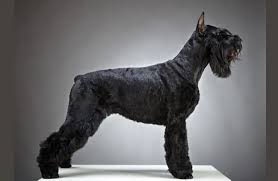
Giant Schnauzer
Conditions of detention
Giant Schnauzers are best suited for homes with ample space and a yard where they can exercise. They thrive in environments where they receive plenty of physical and mental stimulation.
Useful Fact: Due to their size and energy levels, they are not well-suited for apartment living without significant daily exercise.
Nutrition and diet
A balanced diet rich in high-quality proteins, fats, and essential nutrients is crucial. High-quality commercial dog food or a well-planned homemade diet can meet their nutritional needs.
Useful Fact: Giant Schnauzers can be prone to bloat, so it’s best to feed them smaller, more frequent meals rather than one large meal.
Health
Giant Schnauzers are generally healthy but can be prone to hip dysplasia, elbow dysplasia, and certain cancers. Regular health screenings and preventative care are important.
Useful Fact: Regular veterinary check-ups and maintaining a healthy weight can help prevent many common health issues.
Grooming and care
They have a dense, wiry coat that requires regular grooming to prevent matting and tangling. Their coat colors are typically black or salt-and-pepper.
Useful Fact: Regular grooming includes brushing several times a week and professional grooming every 6-8 weeks to maintain their coat’s texture and appearance.
Education and training
Giant Schnauzers are intelligent and highly trainable but require consistent, firm, and positive reinforcement-based training methods.
Useful Fact: Early socialization and obedience training are essential to manage their protective instincts and ensure they become well-mannered adults.
Toys and entertainment
Interactive toys, puzzle feeders, and agility exercises are great for keeping them mentally and physically stimulated.
Useful Fact: Due to their high intelligence, they enjoy complex toys that challenge their problem-solving skills.
Safety
Ensure a secure, fenced yard to prevent them from wandering off. Giant Schnauzers are naturally protective and can be wary of strangers.
Useful Fact: Their strong guarding instincts make them excellent watchdogs, but they should be socialized to differentiate between friend and foe.
Accessories
A sturdy collar, leash, and harness are essential for daily walks. Consider a strong, durable crate for travel and training.
Useful Fact: Due to their strength, it’s important to use high-quality, durable accessories to ensure their safety and comfort.
Socialization
Expose them to various people, environments, and other animals from a young age to build confidence and ensure well-rounded behavior.
Useful Fact: Regular socialization helps prevent overprotectiveness and aggression towards strangers and other dogs.
Travel and Transportation
Giant Schnauzers can adapt to travel but need a secure crate or harness in vehicles for safety.
Useful Fact: Plan regular breaks during long trips to allow them to stretch and relieve themselves.
Behavior and psychology
Giant Schnauzers are energetic, intelligent, and protective dogs. They require consistent leadership and mental stimulation to stay happy and well-behaved.
Useful Fact: Without proper exercise and mental challenges, they can develop behavioral issues such as anxiety, destructiveness, and excessive barking.
Legal aspects
Ensure compliance with local laws regarding dog ownership, including licensing, leash laws, and breed-specific regulations.
Useful Fact: Some areas may have breed-specific legislation that affects Giant Schnauzers, so check local regulations before acquiring one.


